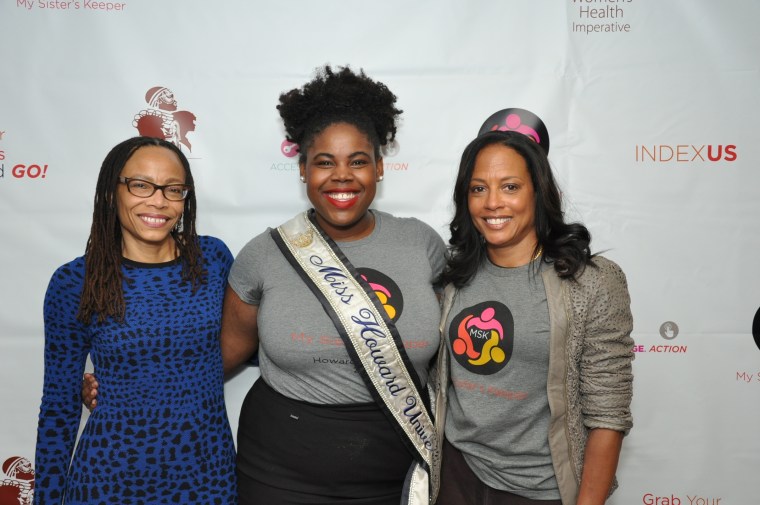When you hear the words reproductive justice, combined with college campus, you might think it is a move to make affordable birth control and abortion services available. But at Howard University in Washington, D.C., and Spelman College in Atlanta, thanks to the Black Women’s Health Imperative’s My Sister’s Keeper, it means so much more.
Linda Blount, the president and CEO of the Washington, D.C. based, Black Women’s Health Imperative, says that she has been working to expand the view of reproductive justice as a movement. She says that starting My Sister’s Keeper on college campuses made sense.
“The data shows that sexual violence, unintended pregnancy and the consequences of risky sexual behavior, are among the leading causes of college dropouts among women and that number is even higher among black female college students,” According to Blount the health care choices black women make are directly linked to social conditions such as socio-economic status, where they live, their education level and access to affordable, quality health services.
Ayana Evans, 25, is a graduating senior at Howard. Evans started to explore what reproductive justice meant to her and other young women of color when she went to one of the first My Sister’s Keeper workshops on campus earlier this year.

Kadijah Ndoye, 21, has just completed her junior year at Spelman College in Atlanta. She is excited about the work that is just beginning to happen on campus. “We are working on building the programming for My Sister’s Keeper at Spelman,” Ndoye says.
According to Ndoye, there are a lot of misconceptions about what reproductive justice means, especially for black women. “We have to educate women on what it is before they can begin to address it,” she says.
“It is also about a woman’s right to education, wellness and safety. It is about how we see the world,” Evans says. “The more I learned about it, the more it became clear that so many problems that face black women are interconnected.”
“Black women cannot wait for someone to save us and include our needs. We have to be our own voice. We have to fight our own fight,” Blount says. “We have an obligation to elevate the conversations that will keep women of color healthy, safe and steadfast in their resolve to lead self directed and empowered lives.” Blount says that My Sisters Keeper was born out of a need that the Imperative saw. “We have an obligation to help our young women find their voices on the things that matter to them and their futures.”
By combining the concepts of reproductive and social justice, young black women are beginning to advocate for reproductive justice recognizing that the health care choices black women make are directly linked to social conditions: socio-economic status, where they live, education level and access to affordable, quality health services.
Ndoye says that for some of the young women on campus it is much more than a political movement. “My Sister’s Keeper has really opened up some conversations for us to talk about self love, self care and owning our beauty.”Ndoye says. “It is important to love yourself and take care of your body. As a part of the reproductive justice conversation, Ndoye says it has been important to talk about sexual expression and still being safe. Evans agrees, and says “the more you know the less you will fall for.”

Blount says that a major discussion point in their reproductive justice conversation is the way that black women are portrayed in the media and in music. She cited reality shows such as The Real Housewives of Atlanta and Love and Hip Hop as examples of the way black women are shown as living for the brawl and the drama. “No matter what the medium, we are always portrayed as hyper-sexualized versions of our white counterparts,” Blount says. “Our culture has devalued the black woman so completely that our young women have lost a sense of their voices and value.”
Evans says, “black colleges graduates go on to be some of the most powerful women in the world. That’s why it is so important to have this opportunity to help black women on campuses to see all the systematic obstacles and challenges that they face.
Courtney Christian, director of policy and advocacy at the Black Women’s Health Imperative says “we see the rights of black women to raise our children in a healthy and safe environment as not only timely, but an essential part of reproductive justice.” She says the headlines of young black men on a regular basis as an example.
Christian says that helping the young women who are embracing reproductive justice and My Sisters Keeper, are finding their voices. “We are not just trying to teach young women how to speak out on campus but how to impact real change in the world, by training them to go to their policymakers and legislators.”
In September, during the Congressional Black Caucus convening, the young women involved in My Sister’s Keeper will headed to the Hill for workshops and interaction with legislators.
Christian says My Sister’s Keeper as a movement that will continue to grow. “If all goes well, we want to see a chapter of My Sister’s Keeper on every HBCU,” Christian says. She says they have already had a lot of interest on majority campuses. “My Sister’s Keeper is reinforcing the message that information and education are the great equalizers in any civil rights movement,” she says.
And while Evans embarks on her next act after graduation and Ndoye heads into her senior year, neither see this as the end of the road for their involvement in My Sisters Keeper or reproductive justice. “We are building a network that will continue the work, while we are building a movement,” Evans says.
